Grow Bolder As You Grow Older
How important is your mindset? How much power does your belief system have over the quality of your life?
If you believe psychologists, philosophers, and social scientists, the answer is quite a bit.
We are under a constant information assault from the environment. In order for any of that incoming data to make sense, the brain must filter and organize our perceptions. Science writer and historian Michael Shermer calls the human brain a “belief engine” https://www.nature.com/articles/474446a, as it brings meaning to our perceptions through our beliefs.
Beliefs shape our thoughts and behavior and are often founded on the words of those around us and by our culture. They are necessary guiding principles, held close because of their connection to emotion.
But what if we think, act, and organize our lives around beliefs that are limiting or false? What if we are being guided by negative beliefs that don’t serve us?
“We see the world not as it is but as we are. Most of us see through the eyes of our fears and our limiting beliefs and our false assumptions” ~ Robin S. Sharma
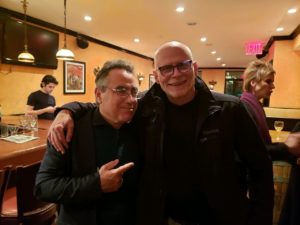
Dan Schneider and Marc Middleton at an I Can Still Do That Foundation Event
Fears and false assumptions lead to prejudice. These limiting beliefs lie at the root of all the “isms” that plague our society. Ageism is one of the most far-reaching and debilitating of these lies, affecting all races, religions, classes, and ethnicities. Yet, it may be the one “ism” that is taken the least seriously.
On April 1, I attended an event in NYC, for The I Can Still Do That Foundation, hosted by my dear friends Dan Schneider and Charlotte Pfahl. The foundation’s purpose is to connect people so they can share information and empower each generation to teach the others www.flobel.org.
Growing Bolder seeks to change people’s mind-sets about aging—a change that can definitely improve your life and maybe even save it.
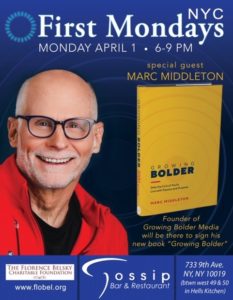 Last April, the foundation’s quarterly First-Monday’s program invited a special guest speaker—Marc Middleton. Middleton, the founder of Growing Bolder and the author of a book by the same name: Growing Bolder: Defy the Cult of Youth, Live with Passion and Purpose, left a 25-year career in television as a news and sports anchor to, at 58, start an online media network, with a critical mission: “to inspire, educate and empower healthy aging, enabling people of all ages to live lives of passion and purpose.” I was impressed by Middleton’s talk that night, inspired by the Growing Bolder website, and blown away by much of his book.
Last April, the foundation’s quarterly First-Monday’s program invited a special guest speaker—Marc Middleton. Middleton, the founder of Growing Bolder and the author of a book by the same name: Growing Bolder: Defy the Cult of Youth, Live with Passion and Purpose, left a 25-year career in television as a news and sports anchor to, at 58, start an online media network, with a critical mission: “to inspire, educate and empower healthy aging, enabling people of all ages to live lives of passion and purpose.” I was impressed by Middleton’s talk that night, inspired by the Growing Bolder website, and blown away by much of his book.
Of course, I have to share!
Growing Bolder is a movement with an inspiring vision: “to become the world’s most influential lifestyle brand for the 45+ demographic by inspiring men and women of all ages to believe that the rest of their life can be the best of their life.”
The seeds of ageism are sown when we are very young
At its foundation, Growing Bolder seeks to change people’s mind-sets about aging—a change that can definitely improve your life and maybe even save it.
Committing to the process of Growing Bolder presents a huge challenge to individuals in our culture, as we have all been indoctrinated to view old age as a time of life defined by decline. The seeds of ageism, Middleton claims, are sown when we are very young, with our first exposures to books, TV, and advertising. Older folks are most often portrayed in the media as forgetful, clumsy, and unbalanced—in both body and in mind. We, unfortunately, internalize these images and form them into negative, limiting beliefs.
Middleton does not mince words! He talks about how “the ‘Machine,’ a powerful combination of corporate, media, private, and governmental forces, wants you to feel worn, weak, and worthless and is spending billions every month to back campaigns of disinformation and despair.” He claims that “we are all victims of a form of cultural brainwashing that is stealing years from our lives and quality of life from our years.”
I would challenge anyone to disagree.
“Nearly 2 out of 3 workers ages 45 and older have seen or experienced age discrimination on the job” ~ AARP
To get a feel for how pervasive and destructive ageism can be, one only has to look at age discrimination in the workplace. Here are just three stats I found in my research:
- A recent data analysis by ProPublica and the Urban Institute of the Health and Retirement Study shows that “more than half of older U.S. workers are pushed out of longtime jobs before they choose to retire, suffering financial damage that is often irreversible” https://www.propublica.org/article/older-workers-united-states-pushed-out-of-work-forced-retirement. In other words, older, loyal workers are most often rewarded by being kicked to the curb!
- More than one-fifth of all work discrimination charges filed in 2016 with the Equal Employment Opportunity Commission were age discrimination complaints https://hr.toolbox.com/article/age-discrimination-take-it-seriously. This number, 21,000, is only the tip of the iceberg, as the majority of ageism instances go unreported.
- According to an AARP workplace survey released in 2018, “Nearly 2 out of 3 workers ages 45 and older have seen or experienced age discrimination on the job” https://www.aarp.org/work/working-at-50-plus/info-2018/age-discrimination-common-at-work.html. Two out of three! And we’re talking about workers as young as 45!
The workplace certainly does not value its older workers, but ageism is not limited to the business world. It permeates every area of society, and the worst hit are probably those who are no longer able to live independently. As Middleton states, “Our culture is fine with putting us into understaffed nursing facilities where we’re alive but not engaged in life in any meaningful way.”
Are You Ageist?
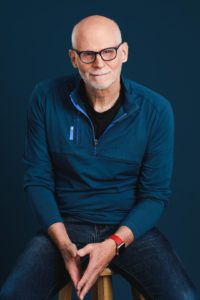
Marc Middleton
We’ve blindly accepted this widespread practice because we have been taught that this is our fate, groomed over the course of our lifetimes to internalize negative beliefs about growing old. Our culture convinces us that “we’re destined to become weak and sickly and will soon have little of importance to contribute. It’s conditioning us to believe that we’re becoming burdens whose value to society has passed… and it’s time to withdraw.” Powerful words, Mr. Middleton! And, sadly, so true.
Ageism has been institutionalized in our society, but it lives inside individuals too. This belief system has made a home in each of our individual psyches. Ageism is unique because whether we’re 15 or 50, 35 or 70, its venom is directed at our future selves. That is why so many of the most ageist people are themselves of “a certain age.”
Middleton asks his readers: “Are you ageist?”
He quickly answers the question: “Unless you’ve lived in a complete vacuum your entire life, it’s impossible not to be ageist to some degree. And when those who are ageist become old themselves, their prejudice turns inward, leading to depression and a myriad of other mental and physical illnesses.”
So … are you on board yet? Ready to examine your belief systems about aging? Ready to rage against the “Machine”? Maybe you’re not as ready as you think.
“It’s not what you look at that matters, it’s what you see” ~ Henry David Thoreau
 Let’s start with our mirrors. When you look at your own reflection, what do you see? (Consider Thoreau’s quote for a minute—it’s in italics just above.)
Let’s start with our mirrors. When you look at your own reflection, what do you see? (Consider Thoreau’s quote for a minute—it’s in italics just above.)
Do you dye your hair at the first hint of grey? Does every new wrinkle make you cringe? Do you spend countless dollars on “anti-aging” eye creams? Have you had any “work” done?
I am not asking these questions to judge. Believe me, I’ve been there, and I still love my $137, 1.6-oz jar of Clarins Super Restorative Night moisturizer (although I only dare to purchase it when it comes with an ample “free gift”).
“We are being hypnotized so we can be monetized” ~ Marc Middleton
We all want to look our best, but must we keep spending so much time, effort, energy, and money on products and procedures marketed to “defy” our age? When we continue to do so, aren’t we just defying ourselves?
It is super hard to resist the “anti-aging” bandwagon. Yet, while we’re jumping through hoops, trying to look younger, those who prey on our fears and negative beliefs are getting rich. According to Middleton, “The global anti-aging market is expected to exceed more than $216 billion by 2021.” That’s an incredible amount of moolah! Thanks to our purchasing habits, ageism has become big business. As Middleton says, “We are being hypnotized so we can be monetized.”
So … we get it! We’re up against an out-of-control Machine! What can we do to stop the insanity?
Growing Bolder offers many paths of action, including healthier eating, and exercise, exercise, and vigorous exercise. But the most powerful way to promote your own healthy, bold growth is to flip the switch on the old belief engine—to change the thoughts in your brain!
“Man is what he believes” ~Anton Checkov
Man is what he believes. So is woman! And when it comes to healthy aging, this maxim has been supported a wide body of research.
Dr. Becca Levy a professor of public health at Yale University Levy “is credited with creating a field of study that focuses on how positive and negative age stereotypes, which are assimilated from the culture, can have beneficial and adverse effects, respectively, on the health of older individuals” https://publichealth.yale.edu/people/becca_levy.profile.
The time to change your belief systems about aging is now!
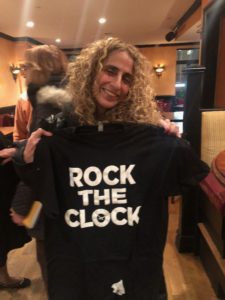 Middleton writes about a study Levy published in 2002, which produced some dramatic findings about the connection between longevity and belief systems: “Individuals with more positive self-perceptions of aging, measured up to 23 years earlier, lived 7.5 years longer than those with less positive perceptions.”
Middleton writes about a study Levy published in 2002, which produced some dramatic findings about the connection between longevity and belief systems: “Individuals with more positive self-perceptions of aging, measured up to 23 years earlier, lived 7.5 years longer than those with less positive perceptions.”
Revisit these four words: “measured 23 years earlier.” The beliefs people hold about aging, even decades before they actually “age,” have a significant impact on their longevity. Kids, the time to change your belief systems about aging is now!
Much of Levy’s subsequent work confirms the need to change ageist beliefs early in life. In a study published in 2009, Levy found that “among participants age 49 and under, those who held negative age stereotypes were significantly more likely to experience a cardiovascular event in the following 38 years than those with positive age stereotypes … A similar effect occurred in a subgroup of participants under age 40 who experienced cardiovascular events after turning 60” https://www.ncbi.nlm.nih.gov/pmc/articles/PMC2666386/.
Be still, my heart!
Another of her studies, published in 2012, found similar results regarding memory: “Those with more negative age stereotypes demonstrated significantly worse memory performance over 38 years than those with less negative age stereotypes … The decline in memory performance for those aged 60 and above was 30.2% greater for the more negative age stereotype group than for the less negative age stereotype group” https://www.ncbi.nlm.nih.gov/pubmed/22056832.
Middleton offers important words to remember: “What the mind believes, the body embraces.”
Old habits die hard. Yet, changing your mind-set about aging may not be as difficult as it appears. It only takes a shift in focus. Middleton sums the problem up in a nutshell: It’s unfortunate that some are so focused on accepting “the realities of aging” that they can’t embrace the possibilities of aging.”
Can it be that difficult to shift our focus to possibilities? Isn’t possibility what inspires us, what brings us joy?
There are some glimmers of hope on the horizon. The World Health Organization is currently funding four research teams to investigate ageism, according to a NYTimes article this past April https://www.nytimes.com/2019/04/26/health/ageism-elderly-health.html. One of the teams, from Cornell University, completed a study that evaluated the success of anti-ageism programs. Dr. Karl Pillemer, lead author of the study found that “Ageist attitudes don’t seem as baked in as we think. They may be relatively malleable.”
Terrific news! Participants, from preschool age to young adult, demonstrated “significantly less ageism on attitude tests and greater knowledge of aging than comparison groups that hadn’t taken part” in programs that were either educational, intergenerational, or a combination of both.
Moral of that story: we need to get out there, connect with younger generations, and educate, educate, educate—by example!
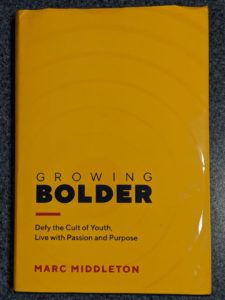
People are living longer today—and healthier! Possibilities are real—and available. Growth is up to us. I highly recommend the Growing Bolder book https://www.growingbolder.com/shop/growing-bolder-defy-the-cult-of-youth-live-with-passion-and-purpose/
and the Growing Bolder website https://www.growingbolder.com.
In both, you will find many inspiring stories and interviews of people “just like you,” who have made the choice to seize possibilities that excited them. There’s Frieda LeFeber, for example, who began painting at 76 and had her “first solo show at a major art gallery at age 99.” And there’s Ida Keeling, who competed at the Penn Relays, just four days shy of her 101st birthday.
These women and many others just like them felt the fear but took the risk anyway. All have benefitted from that choice. When we toss out our old beliefs about getting old, we not only enrich our own lives but those of others around us. We show the world a new and vibrant view of aging and pave the way for generations to come.
Are you ready to commit to embracing possibility as you age?
What new experiences would excite—and scare—you? What’s stopping you from taking the first step?
As always, I’d love to hear your thoughts! Post a comment or send me an email!
Have a wonderful week, everyone!
See you next Friday!
Diane

En outre, l’effet complexe de l’appareil sur le tissu prostatique et les terminaisons nerveuses permet sf-telemed de rétablir la fonction sexuelle et d’améliorer la puissance.


After being forced out of a job I loved, and where I was making a positive impact on young people, I spent 9 months looking after my daughter during a health crisis.
After that, I felt old and used up, and spent most of the day watching TV. My partners had the love and courage to challenge me about the book I have been “planning to write” for 30 years. I committed to a program to finish a first draft in 100 days. That will take me to September, and if I don’t finish by then, I figure I can knock out the rest by joining NaNoWriMo in November.
This article gives me hope that I can achieve that goal *and* keep up with the rest of my life. Thank you, Diane!
Alyce! Thank you so much for sharing your story! I love that after 30 years, you are getting down to business! I bet the writing will be that much richer with your added experience and wisdom. Please keep us posted on how the draft comes along–I’d love to hear more about it!
Diane – I needed this post! My mother said things like, “growing old is hell” . So far my experience – luckily – has been different from that dire prediction, but I do need reinforcement to stay positive as there are some difficult parts of aging.
I will remember – older is bolder! I love that. It is at 73, my new mantra!
Thanks!
Hi Nicky! I’m so glad that your experience of growing older has been positive, and I love the new mantra!!!
Such a great column. Makes me happy! Thanks, Diane!
Thanks, Alison! Makes me happy too!
Inspiring and empowering blog Diane. Awesome content!
Thanks, Denise! Glad you felt inspired and empowered!
Exercise and weight loss are giving me back my energy. I’ve changed priorities and put them at the top of the list.
That said, working on intentionality in my marriage, my writing, and my involvement in volunteer activities gives me drive and focus.
Vacations, after intentional work, are becoming important. Retirement is not one big vacay!
What a great experience you must have had at the conference. Excellent post!
Yay for new energy, exercise, and weight loss, Greta! AND for intentionality in your marriage, writing and volunteering! I think it takes a certain maturity–and age–to even understand intentionality! Isn’t it wonderful?
At 72 years old, I work as a temp at a major NYC medical center which means I’m assigned short term jobs in offices with people who could all be my children or GRANDCHILDREN! It is with fear and trepidation that I face each new assignment, wondering what they will all think when a person my age appears at the door. I don’t let my nerves show and I walk in with the attitude that l’m 25 and I can do it. I truly feel that my inner self, my spirit, my soul is the same age now as it was when I was much younger. Because of that attitude and the fact that I can hum a few Taylor Swift songs I have made some good friends (younger than my two daughters!!) I feel the positive signs of my aging are that I have become wiser, more secure in who I am, less of a worrier and more in touch with appreciating the good things life has to offer. I’m also very motivated and optimistic at seeing so many fellow 70 plus year olds in such prominent and powerful positions … Bernie, Nancy Pelosi, Joe Biden, Hillary, Bill, Special Counsel Mueller, John Lewis and others. There is one thing that drives me crazy about aging in our society and that is the quest to look young. I would love to see an end to the ridiculous marketing of anti aging products like wrinkle removing creams directed towards young women only in their 20s. My advice to them is relax and age gracefully. Stay positive about maturing .
And NO you really don’t have wrinkles in your 20s. Well Diane these are the thoughts that your blog has stirred up in me.
In my opinion ….Seniors Rock!
Wow, Marion!! LOVE it! You do have a “bolder” attitude and it makes me cheer! Yay for the wisdom, for feeling more secure and for worrying less! And, I agree with you about the quest to look young … ‘enough said about that one!
You go get ’em!
Seniors Rock!